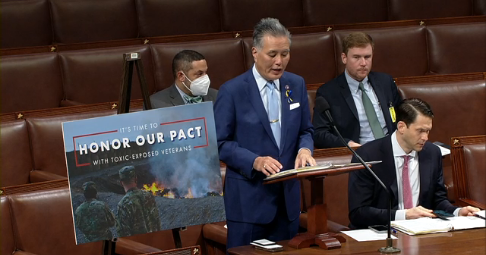Chairman Takano Urges Immediate Passage of Bipartisan Honoring Our Pact Act
WASHINGTON, D.C—Today, House Committee on Veterans’ Affairs Chairman Mark Takano (D-Calif) delivered remarks on the House floor in support of his bipartisan bill, H.R. 3967, as amended, the Honoring our Promise to Address Comprehensive Toxics Act of 2021 or Honoring our PACT Act. This follows Chairman Takano’s press conference earlier today with Speaker Pelosi, Members, advocates Jon Stewart and John Feal, and Veterans Service Organization (VSO) leaders.
Full video of Chairman Takano’s remarks can be found here.
Chairman Takano’s remarks as prepared:
Mr./Madam Speaker, I rise today in support of H.R. 3967, as amended, The Honoring our PACT Act of 2021.
When we sent our servicemembers into harm’s way, we made a pact to care for them when they came home. But for too long, Congress and the Department of Veterans Affairs have been slow to accept responsibility and cost of that care, citing high costs or lack of absolute, scientific proof of illness connections to service. The result is a disability claims process that is cumbersome and places the burden of proof for toxic exposure on veterans themselves.
Every day more and more veterans speak out about exposure to environmental hazards and other toxic substances during their military service.
Recently, I put out a call encouraging toxic-exposed veterans to share their experiences with the House Veterans Committee. We heard from thousands of veterans in 49 states. These reflections are very powerful, and I'd like to share some of them with you now.
Navy veteran Ed described how toxic exposures overwhelmed his senses, he wrote “you couldn’t escape [the jet fuel]. You could see it, smell it, and taste it.”
I heard from Marine veteran Mike who said, “Even when we weren't actively engaged in dumping items into the burn pit, we were still exposed.”
Air Force veteran Christopher R. described his dealings with VA stating “I continue to be rejected because they say that it's impossible to prove that it is service related. I never worked with chemicals before my service or since. I feel like a nuisance to the VA health system.”
I heard from the widow of Army veteran Austin Monk who said, “No wife should have to bury her 22-year-old husband because of his exposure to unsafe conditions while in service to his country.”
These stories are heart wrenching and frustrating. Our veterans are fighting their own government to grant them the care and benefits they’ve earned.
We should be outraged listening to these stories, and it should be clear how urgent passing the Honoring our PACT Act is for our veterans. Veterans and Veterans Service Organization agree. Madam/Mr. Speaker, I ask unanimous consent to enter letters of support from more than 42 Veterans Service Organizations into the record.
I wish to thank Speaker Pelosi for fulfilling her commitment to bring this bill to the floor. After years of diligent input from my colleagues, our staff, VA, VSOs, and toxic-exposed veterans themselves, I am confident we are bringing the best possible version of this bill up for a vote.
The Administration agrees and has stated that it “strongly supports” this legislation. Madam/Mr. Speaker, I ask unanimous consent to enter the Statement of Administration Policy for H.R. 3967 into the record.
It is now time for the Members of this body to answer a simple question: “Am I willing to support our troops and honor our nation’s promise to them?”
This bill addresses the true cost of war and opposing it would be a vote against our servicemembers and veterans. Such a vote would be inconsistent with the “thank you’s” and patriotic displays so many of my colleagues offer on Veterans Day. Veterans want action. They deserve OUR action.
We made a promise to deliver comprehensive toxic exposure legislation, and I intend to keep that promise.
The Honoring our PACT Act will address the full scope of issues affecting toxic-exposed veterans’ access to VA care and benefits, while reforming VA’s presumptive decision-making process. It will expand VA healthcare eligibility for over 3.5 million veterans exposed to burn pits and establish a presumption of service connection for over 23 respiratory illnesses and cancers. There is no other toxic-exposure legislation in Congress like it in scope or soundness.
Before I close, I must emphasize something essential: we cannot renege on our responsibility to toxic-exposed veterans because of any perceived sticker shock.
Cries for “offsets” and “pay fors” did not stop Congress from passing a $1.9 trillion tax cut for corporations and the wealthy in 2017. Over the past 20 years, Congress and our country made the choice to spend trillions on other priorities while sending servicemembers into harm’s way at a cost of $6.4 trillion dollars.
We know that this Congress is willing to find money when it wants to, as it recently demonstrated by adding $25 billion to the last National Defense Authorization Act.
When our country goes to war we don’t nickel and dime the Department of Defense -- and we shouldn’t try to pinch pennies when it comes to covering the care for toxic-exposed veterans.
We will not stand by and be lectured about fiscal responsibility when we have a MORAL obligation to America’s veterans. The time to meet that obligation is now.
###
Next Article Previous Article

